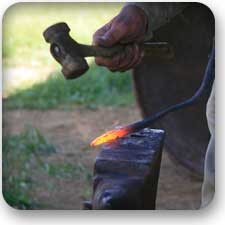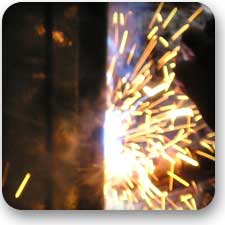 Crafting - Crafting magical items is an invaluable resource to the adventurer. It is the art of combining nonmagical or magical components (1+) or pure quality (1+) or better metals and gems into something of great value. They are a great service to themselves and the community whether they are repairing a rare collectors item, making a work fo art for a patron or customer, preparing items of their type to be used by other crafters, repairing broken items or designing and making a magic item of their own.
Crafting - Crafting magical items is an invaluable resource to the adventurer. It is the art of combining nonmagical or magical components (1+) or pure quality (1+) or better metals and gems into something of great value. They are a great service to themselves and the community whether they are repairing a rare collectors item, making a work fo art for a patron or customer, preparing items of their type to be used by other crafters, repairing broken items or designing and making a magic item of their own.
Requirements - Crafting an item requires a proper tool kit that is at least equal to your skill percentage in the specific craft; for instance jewelers require a jewler's kit. Proper Fuels are also required. The use of quality fuels is essential in the burning process and fuel must be equal in level to the single highest quality ingredient. A suitable forge is also a key ingredient and must be equal to the level of the highest ingredient as well.
What they Do - A crafter is needed to prepare all items of their type before they can be used in their magical preparation, to make artwork, to identify items, to make magical items of their own, and to repair damaged items including collectors items and heirlooms.
Preparing Materials - All but the most dedicated crafters need other crafters to make magical items because most items require a component from each of the crafts in order to be enchanted.
Professional Courtesy - It is common for each crafter to make their work available to other craftsmen in the area if possible before it is sold. Most crafters find someone of each other type of craft to trade work with for no charge. These types of trades are a common courtesy but are difficult to find in some areas. They are usually available in most of the towns and larger areas however. They can be refused but tradition dictates it be for some legitimate reason. Not all craftsmen hold to the code however.
Privacy - It is common for each crafter to make their work available to other craftsmen in the area if possible before it is sold. They do not however have to let the other craftsman watch in the production fo the materials. That is considered a private art and is done in solitude or with a teacher learner agreement. In fact is is impolite for them to ask to watch you work unless of course you are working on an item that requires multiple caster such as a +70% item for example..
Making Art - Making artistic representations of normal items is a highly honored tradition and it often more in demand in smaller areas than it is in the big city. A man may want a special heart shaped wedding ring however and be too far from the city to find one and a jeweler can practice his trade and make some coin. The best part is the customers are almost always happy and overjoyed. Many artisans specialize in this area and can make artistic masterpieces.
Identify Substance - A character can use their craft to identify the composition of a particular substance that they are familiar with using, and what some of its properties and characteristics are. They can use chemical tests using very small bits of material and use up no more than the tinyest fraction of the substance in the process. Crafters cannot identify magic items but they might be albe to identify the level by identifying a substance in the item that would hint at its level. Identifying exactly who made an item and what its powers might be is done through the appraisal skill. They can identify most nonmagical substances and usually tell when a substance is magical in nature even if it is out of his own area of expertise.
 Making Magical Items of their Own - Making a magical item is one of the most difficult processes the crafter can undertake and requires quite a bit of preparation and at least four hours to combine. The typically use one magical item of each crafting type. Each one must not only be a work of art but must be prepared and crafted according to recipes,
Making Magical Items of their Own - Making a magical item is one of the most difficult processes the crafter can undertake and requires quite a bit of preparation and at least four hours to combine. The typically use one magical item of each crafting type. Each one must not only be a work of art but must be prepared and crafted according to recipes,
Minor Crafts - Minor crafts can be done by any crafter and they include pottery making, nonmagical smelting work, maintaining a forge, glassblowing, create physical crafting stations (of their type), creating locks and the preparation of nonmagical items of all types including herbs and spices.
Demand - Crafters are often in demand in both small places and especially in the larger towns where a good craftsman can almost always find work of some sort.
Levels and Practice - A character with these skills can use them to gain points that will allow them to make tougher and tougher items. These only increase by succeeding at crafting and are separate fom the character levels. They are known as artisan levels.
Magical Crafting - Most magical projects under 70% requires over a half days worth of work per item and are broken down into 4 different checks of one hour each. If two are working it must be lead by one crafter and that lead crafter must make three of four successful checks to have a chance to create the item. The other person contributes 10% of their skill and does not need to roll. The lead person must roll a 100 sider add up your total until the number of points is reached. Each recipe has a minimum number that must be rolled to be successful. If you fail to reach the points in the alloted time you fail the recipe but only the fuel is consumed.. If you reach the assigned number of points the recipe is a success and you have created a magical item.
Crafting Powerful Weapons - Long Term Crafting - Some large projects like a 70%+ item require over a weeks worth of work per crafter and are broken down into 8 different checks of eight hours each. Such a powerful magic item usually requires a crafter of all types and an item from each of their types used in the recipe. All crafters must make their checks for any progress to be made or the process must start over. The lead person must roll a 100 sider and then each of the others in turn rolls. If all are successful you add up your total until the number of points is reached. If you fail to reach the points in the alloted time you fail the recipe. If you reach the assigned number of points (usually
Artifacts - It usually takes around 6 months to ten years to create an artifact and no small fortune to set up a proper forge and tool kit as well as procuring the ingredients and fuel.. It may be difficult but it is the ultimate expression of the art of crafting and one such item can make the crafters fortune and earn them a high classed clientell in the process.
Materials - You can purchase all the materials needed for a beginning a crafting profession already prepared and ready for use at most of the magic shops and at nearly any crafting station.
Renting a Crafting Space - You can rent a space by the hour or by the week at crafting stations of greatly differing quality and price in many places across the kingdom that are signified with a symbol of their craft (see individual crafts) over their doors.
Business Opportunities - Alchemists are often willing to pay handsomely for rare crafting ingredients that are found and properly preserved by adventurers. Even if you don't choose crafting you may come across these items in your travels or through use of gathering professions. For special orders they often hire adventurers to find them particular ingredient they need to make normal and especially the higher level items.
Time needed to create – The time needed to create an item depends on the item.
Selling Items – Most items cost 90% of what they sell for including the rental on a forge and etc. If there is unusually high demand then an item may sell for much more however.
Learning Secret Recipes - As a craft is studied and trained, more of it's lost arts may come to be discovered by those patient and ambitious enough to seek them out. New recipes can be discovered through experimentation or the discovery of secret recipes known only to the very best crafters of the lands. Magical recipes are highly treasured and most are closely guarded secrets.
Item and Ingredient Availability - Most very powerful items (70%+) and many powerful ingredients must be crafted or gathered and are not readily available for purchase.
Buying Recipes - You choose recipes like you would spells. Some are free and other are special recipes must be chosen according to your skill and craft. Recepies must be bought similarly to spells.
Free Recipes - Crafters receive (5) new standard recepies when they achieve a new plateau and move to a more powerful material. This usually happens in increments of +10 such as +30 or +40 for example.
Cost of a Crafted Item - A crafted item costs 90% of its item cost plus the rarity multiplier of the ingredients if any of the ingredients aren't readily available. When figuring the cost of a crafted item there are ten components, one from each magical sphere, one for the forge and the cost of upkeep on your tools, and one for the fuel. Each of these represents 9% of the total cost.
Types of Artisan - There are eight different types of magical artisan. Each artisan makes a unique set of class armor, a class weapon, a training item, and a set of class adornments, as well as other items that can be used by all players to increase the power of a character in amazing ways.While Artisans specialize in a particular area almost all artisans have some skill in working with all types of materials. The names are for the most part for lay-people to identify the non-magical items they make and find the right artisan with little effort. For example while a woodworker may sound like they can only work with wooden items they are equaly at home making the metal chain items they use to connect their Imperial armor or the precious metal infused bindings used to make astral guardian adornments. Don't get too hung up on the names.
Artisan Levels (separate) – An artisan level is similar to a profession except it requires a level of artistry with the craft you have chosen. Artisans can make magical devices, armor and weapons for example. Choosing an artisan skill as a starting skill requires four skill points. It is not required to become an artisan but if chose it starts you at 10th level in the appropriate tradeskill. You receive bonuses for successfully making or discovering a new recipe.
Tradeskill Levels (Getting Started) – choosing a profession as a starting skill starts you at 1st level. Expert training can bring this up to as high as 30% or 30th level.
Improving your Skill - You receive bonuses for successfully making items or discovering a new recipe (see below).
Gaining a Level – By working at a profession as a skill you can gain a level. You receive a large bonus (+500) for successfully making or discovering a new recipe of your level or higher. You also gain (+100) for successfully making a magical recipe of your level that you do not know already or +5 each time you make an item of a normal known type of your level. Once +1000 points is received you get a tradeskill level and continue on. Extra points are rolled over and it is even possible (but ectremely rare) to gain more than one level at a time.
Perfect Scores - If you roll a perfect crafting score (usually 100) while working on a recipe of your level and that score results in gaining a perfect score on the item you will gain automatically gain a level.
Stacking Bonuses - Discovering a new recipe and then making the new recipe the first time would give you 110 points. (+110)
Class Weapons - If a character gets a special "class" weapon made by a craftsman that doesn't specialize in the process and have the proper recipe to make the item then they must be made in assisting another craftsman that specializes in that type of weapon or must alter or repair an existing weapon of the type desired.

